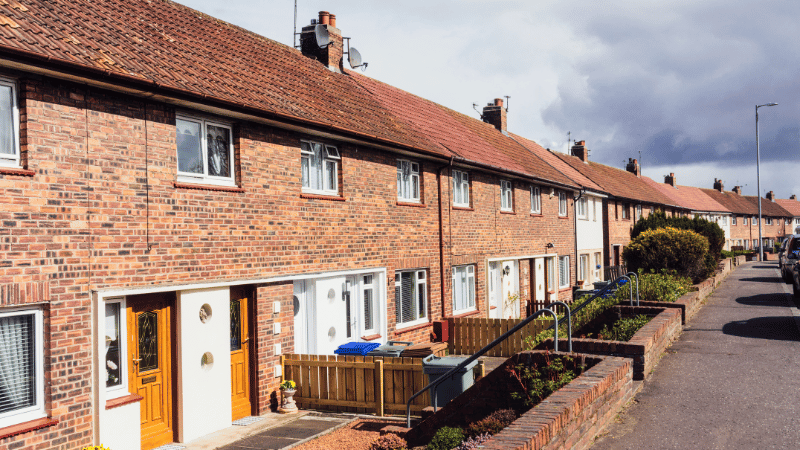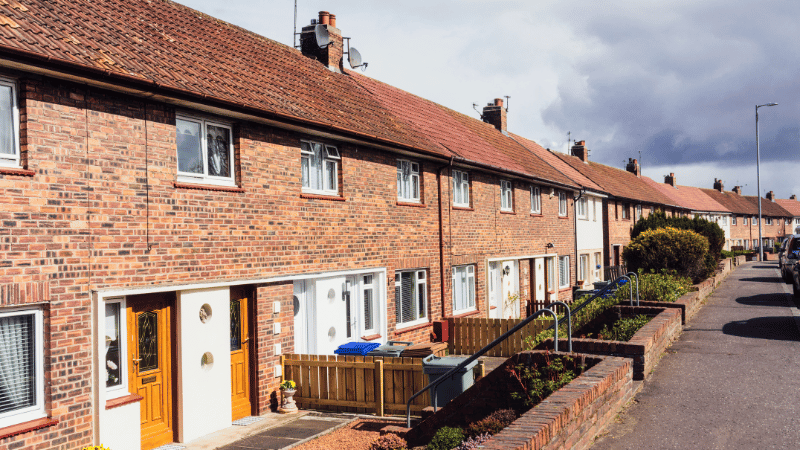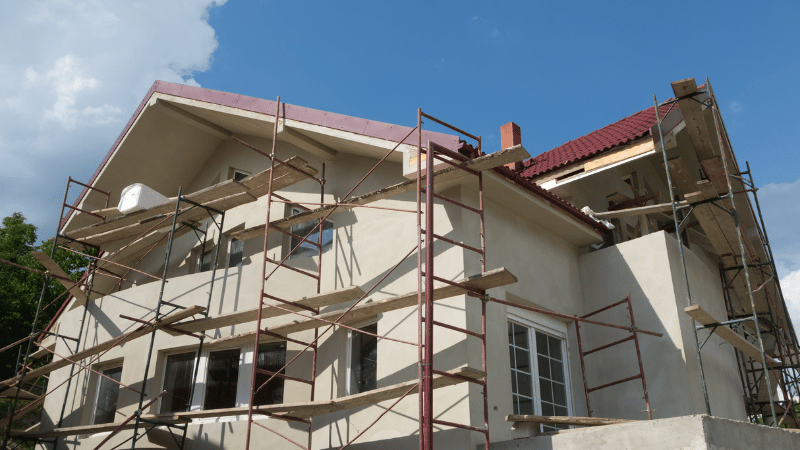Categories
Can You Have Two Mortgages on One Property

Can You Have Two Mortgages on One Property?
Yes, you can have two mortgages on one property - it's known as a second charge mortgage.
It's a little more complicated than a yes or no, however, and in this guide, we explain what you really need to know about second charge mortgages, how they compare to remortgages, the costs, how much you can borrow, the pros and cons, and much more.
To speak to an adviser about what's best for your situation, please get in touch below.
Table of Contents
First vs Second Charge Mortgages
Assessing Risk - The Key to Second Mortgage Rates
How Much Can You Borrow with a Second Mortgage?
Second Charge Mortgages vs. Remortgaging
Commercial Second Charge Mortgages
The Use of Second Charge Mortgages
Managing Second Charge Mortgages
Second Charge Mortgages for Later Life Equity Release
The Pros and Cons of Having Two Mortgages on One Property
How to Apply
First vs Second Charge Mortgages
To properly understand the world of second mortgages, we need to delve a little into the idea of debt levels.
First, consider your main mortgage. This is known as your first charge mortgage and is senior debt. Senior debt is priority debt and should anything happen that results in the sale of the collateral - in this case, the property - then senior debt is paid first before any other considerations.
Conversely, any subsequent mortgage, or second charge mortgage, is paid only once the senior debt is repaid. This is called subordinate debt, because it is subordinate, or of secondary importance, to the senior debt.
Assessing Risk - The Key to Second Mortgage Rates
Mortgage rates are determined by risk. The riskier the proposition, the harder it is to obtain a mortgage and the larger the rates will be.
Second charge mortgages are riskier than first charge mortgages. This is easy to understand becuase if the first charge mortgage is going to take priority when it comes to repayment, then it’s less risky for the lender, whereas the second charge mortgage has to wait its turn to be paid.
For this key reason, second charge mortgages have higher rates and are more costly to the borrower than a first charge mortgage. Plus, they’re more specialist and a little harder to obtain.
Remortgaging can be cheaper than a second charge too, becuase you're just replacing your first charge - but not always. Here are three example scenarios to consider:

When interest rates rise significantly (like they have done in the past 3 years) you may find that keeping hold of an existing low fixed mortgage rate and getting a second charge at a higher rate is cheaper than remortgaging your entire debt as rates are now less competitive.

Or, if you now have a significantly worse credit score than you did when you originally took out your mortgage, you may no longer be eligible for the attractive rates that you currently have - so, a second charge becomes more cost-effective as you can protect the low rate on the majority of your debt.

And finally, many mortgages have high ERCs (Early Repayment Charges), so in some cases, a second charge mortgage is cheaper in terms of total cost because you avoid paying charges for remortgaging early.
How Much Can You Borrow with a Second Mortgage?
Equity is a key part of how much you can borrow with a second charge mortgage.
Equity is the amount of something you own outright and, when talking about mortgages, it’s the part of the property that doesn’t have any mortgage leveraged upon it.
- If you own a property worth £500,000 with no mortgage, then you have 100% equity, or £500,000.
- If you own a property worth £500,000 and have a first charge mortgage balance of £250,000, then your equity is 50%, or £250,000.
- If you own a property worth £500,000, have a first charge mortgage balance of £250,000, and then a second charge mortgage balance of £80,000, then your equity is 34%, or £170,000.
As a general guideline, second charge mortgage providers are unwilling to offer loans that lower your equity below 15%. This is often defined as a total of 85% maximum loan-to-value.
- If the property is worth £500,000 and you currently have 100% equity (£500,000) and no mortgage, you could potentially obtain a first charge mortgage of 85%, equal to £425,000.
- If the property is worth £500,000 and you currently have 50% equity (£250,000) due to a first charge mortgage, then the maximum second charge mortgage size would be around 35%, equal to £175,000.
- If the property is worth £500,000 and you currently have 34% equity (£170,000) due to first and second charge mortgages, you may be able to obtain a subsequent third charge mortgage of 19%, equal to £95,000. This third charge mortgage would be subordinate to both the first and second charge mortgages and have even higher rates representing the highest risk level.
Some lenders may be happy to consider lending beyond the standard 85% LTV level - it is always worth seeking advice if this is needed.
To book a consultation with a specialist, please get in touch below.
Second Charge Mortgages vs. Remortgaging
The primary alternative to a second charge mortgage is to refinance, or remortgage the existing mortgage. In this instance, a new first charge mortgage would be obtained, paying off the original first charge mortgage in full and replacing it.
If this can be done, why try to have two mortgages on one property? Surely, it makes more sense to keep things simple and remortgage? Of course, things are not always this easy. Consider:
Favourable interest rates - It may be that your current first charge mortgage has a superior fixed rate that simply cannot be matched. In this instance it would be inefficient to replace it, and could substantially increase the overall costs of the mortgage. It is often far better in this situation, to keep the original mortgage with its superior rate in place, and add a second charge mortgage for the additional funds.
Early repayment fees - The terms of your first charge mortgage may include expensive early repayment fees that make remortgaging an expensive option. Again, it would be better in this case to add a second charge mortgage and let the first charge mortgage run its course.
Relatively small sum required - If the amount needed is relatively small, it can often be more prudent and time-efficient to use a second charge mortgage to avoid affecting the first charge mortgage that’s already in place.
Change in credit status - If your credit status has changed since putting the first charge mortgage in place, or if lenders are more stringent with their lending criteria, then you may simply be unable to obtain a viable remortgage offer. In this case, a second charge mortgage is the only real option.
For these reasons, second charge mortgages have a valuable place in the mortgage landscape.
Commercial Second Charge Mortgages
Businesses often use second charge mortgages and subordinate asset-based finance to secure capital for expansion. There are several products in this sphere, providing businesses the means to leverage their main tangible assets for growth.
Businesses should take care when leveraging property for loan purposes, undertaking comprehensive risk assessments as, should the expansion project fail to produce results, strain will be placed on cash flow, potentially risking repossession.
The Use of Second Charge Mortgages
Second charge mortgages can be used for a variety of purposes, although some restrictions do apply. Like all financial products in the UK, the Financial Conduct Authority (FCA) oversee mortgages and ensure responsible lending.
This limits residential second charge mortgages from being used for high risk ventures or to fund business activities.
If you are looking to leverage your home to startup or fund a business then you may need specialist finance advice. Speak to us at Clifton Private Finance for some one-to-one advice regarding your need. Commercial second charge mortgages do not have any such limitation.
Residential second charge mortgages are commonly used for:
- Home improvements
- Debt consolidation
- Helping family
- Additional large purchases, such as a car purchase or holiday home
For businesses, subordinate asset-secured debt can be used for any business activity including:
- Investment into new employees
- Marketing needs
- Equipment or vehicle purchases
- Business debt consolidation
- Stock and inventory
- Cash flow to fulfil large customer orders
- Short-term seasonal cash flow bridging
- Mergers and acquisitions
- Initial public offerings
Managing Second Charge Mortgages
When considering having two mortgages on one property, it is essential to look at the long term finances and how they might affect you. A mortgage is a very long-term debt commitment and your circumstances are likely to change during its lifetime. It is vital to consider how you will manage the mortgage not just in the short term, but in the years to come.
As with any mortgage, your home is at risk if you do not keep up the regular payments for both your first and second charge mortgages.
As a second charge mortgage is not a remortgage, you will have two separate debts to manage in the years to come. These means:
Managing repayment due dates - If you have a regular income, it is advisable to set both your first charge and second charge mortgages to be automatically paid on payday. It can also be sensible to offset other, less important direct debits to the following day, such that if any payments are missed, they are for smaller things, such as TV subscriptions or gym memberships, rather than essential mortgage obligations.
Increasing insurance - Your first charge mortgage provider will likely have ensured you have the correct life insurance in place to cover the mortgage should you pass away or become unable to work. This insurance will need to be expanded to cover the additional debt obligation of the second charge mortgage.
Understanding rates and terms - It is advisable to reassess any mortgages on an annual basis, to look at the changes in the market and your own financial standing to see if they can be refinanced favourably. Fixed terms will come to an end, and often significant amounts can be saved through efficient refinancing - you may even reach a stage where you want to merge both your first and second charge mortgages into one replacement remortgage. Keeping in contact with your mortgage advisor and engaging regularly with the marketplace will ensure that your debt remains as cost-effective as possible.
Considering overpayments - If either your first or second charge mortgages have an efficient overpayment structure, it is often worth making overpayments when you can to lower your debt burden. Again, financial advise is essential in determining the correct course of action when revisiting your debt management.
Second Charge Mortgages for Later Life Equity Release
A range of specialise second charge mortgages are available for retirees and older people, providing a way to release equity in the property to lift the financial burden in retirement (or just provide the funds needed for a fantastic holiday!).
These include:
Lifetime Mortgages - A mortgage that provides considerable immediate capital that isn’t repaid until death or leaving the property. A second charge lifetime mortgage gives you access to the equity locked in the home without worrying about monthly repayments.
HELOC (Home Equity Lines of Credit) - Structured in a similar way to a credit card, only with a credit limit that represents the equity in your home, HELOCs are a relatively new product in the UK, offering homeowners a flexible way to utilise the equity tied up in the home without having to sell.
Retired Interest-Only (RIO) Mortgages - An option that merges the benefits of an interest-only mortgage with the best parts of a lifetime mortgage, a RIO mortgage can help retirees purchase new property, release equity for debt consolidation, or provide support for family members, all without placing too much debt leverage on the home.
The Pros and Cons of Having Two Mortgages on One Property
As can be seen, there is much to consider when contemplating a second charge mortgage. Here are some of the advantages and disadvantages of a second mortgage:
PROS
- Releasing funds tied up in the property for immediate use.
- No need to interfere with the existing first charge mortgage.
- Using property as collateral offers larger loan sizes and better rates than similar unsecured loans.
CONS
- Second charge mortgages are riskier for the lender, thus higher rates.
- Places additional strain on cash flow.
- Home is at risk if repayments are not made.
How to Apply
Can you have two mortgages on one property? With our help, you can. At Clifton Private Finance we have a dedicated and experienced team who work tirelessly to keep up-to-date with the complex UK mortgage marketplace.
Our experts can find you the second charge mortgages that offer the best rates, with terms to suit you. Contact us today to unlock the equity tied up in your home.



.png)










